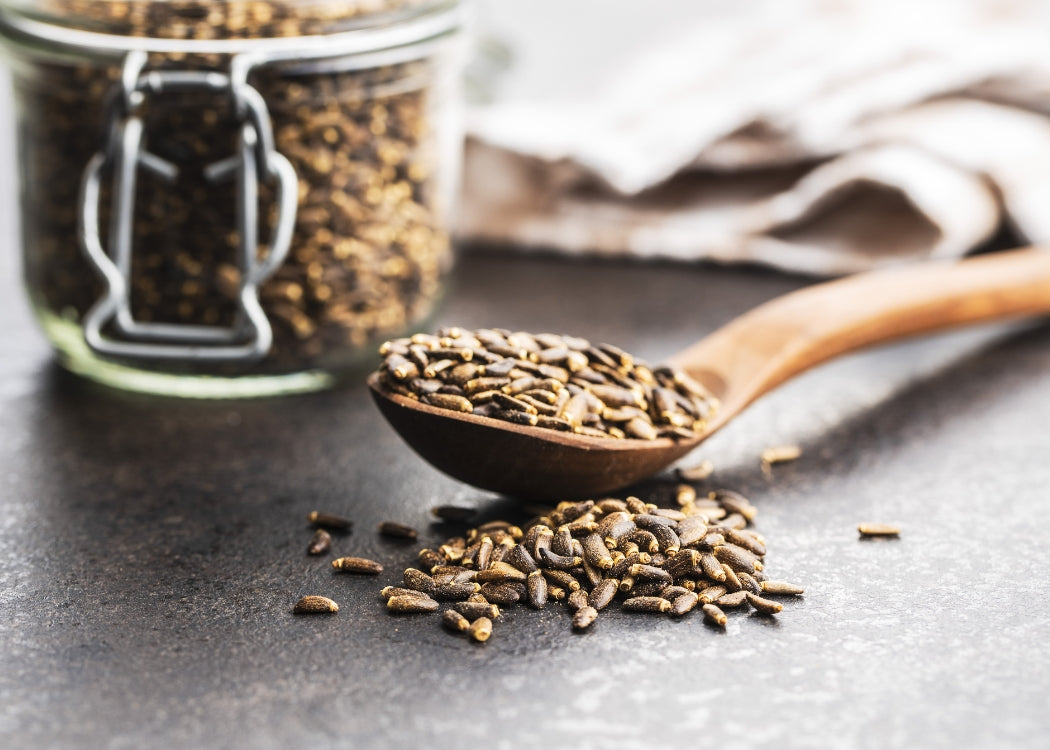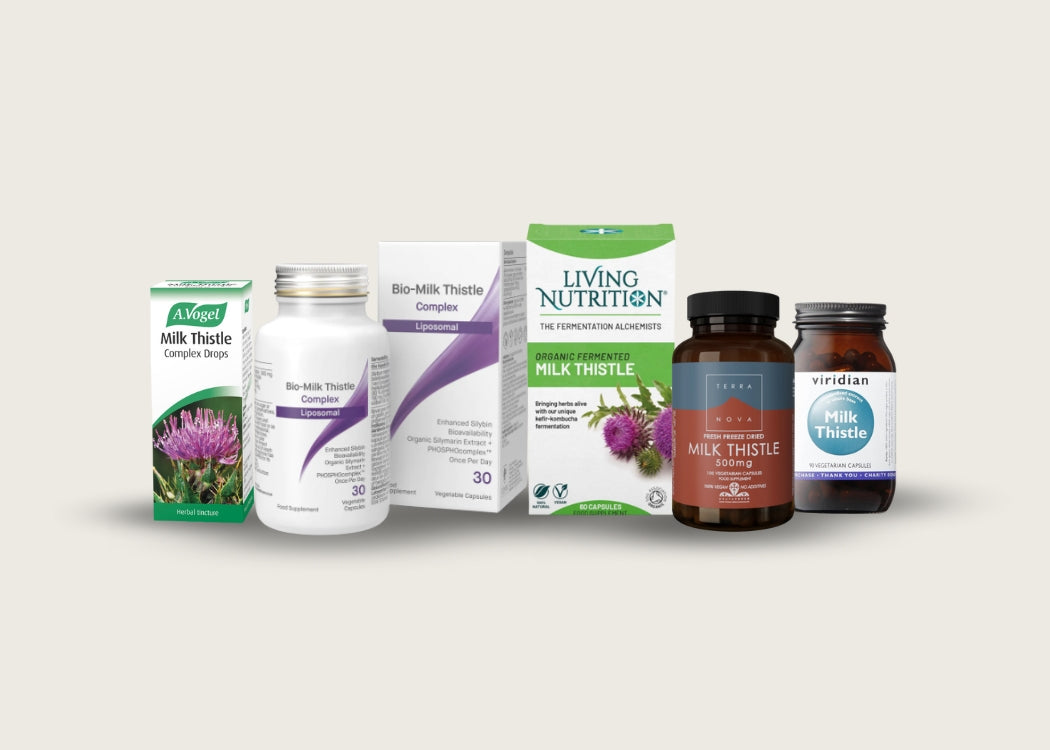Milk Thistle: Magical or Misunderstood? Discover Science-Backed Benefits
For centuries it’s been used as a remedy to cleanse the liver, gall bladder and blood. You’ve probably taken milk thistle after a night of excess. But, based on the latest research, milk thistle benefits extend to pain relief, wound healing, anti-viral activity, and a blood-sugar regulating, anti-obesity effect. Let’s explore how you can use milk thistle for fatty liver and so much more.
By Nina Sabat (BSc Dip NT)
What Is Milk Thistle?
An edible flowering thistle…
Milk thistle (Silybum marianum) is a species of flowering thistle belonging to the daisy (Asteraceae) family. Known by a variety of names it is also called holy thistle, lady's thistle, Marian thistle, St Mary thistle, silymarin and wild artichoke. Milk thistle is native to southern Europe, southern Russia, Asia Minor, and northern Africa. As a plant that tolerates poor soil, milk thistle is easy to grow. But a word of warning if you’re tempted to do so. Milk thistle is highly invasive. In some regions of non-native countries, like North America, it can even be illegal to plant!
The flower, root and leaves are all edible. However, the greatest therapeutic benefits are derived from milk thistle seeds.
A source of silymarin and other active compounds…
Silymarin is a flavonoid-rich compound extracted from milk thistle seeds.
Silymarin is composed of silybin (roughly 60%), along with isosilybin, silychristin, isosilychristin, silydianin, and silymonin. These 6 chemical constituents are all types of flavonolignan, a subclass of flavonoid.

Naturally, there are more active chemicals to be found within the milk thistle plant. There are flavonoids (like quercetin, apigenin and naringin), as well as omega oils (linoleic acid), tocopherol (vitamin E), plant sterols, sugars and proteins. [1]
Silybin and the other active chemicals all contribute to milk thistle’s pharmacological actions and its antioxidant, anti-fibrotic, anti-inflammatory, anti-viral and anti-toxin effects.
A traditional liver remedy…
With a history of traditional use dating back to at least 40 - 90 AD, milk thistle’s healing properties were noted by Dioscorides, a Greek physician.
Traditionally, milk thistle was prized as a remedy for liver dysfunction, gall bladder disorders, and as a cleanser of blood and the intestines.
In modern times, milk thistle has become the go-to herbal remedy to protect the liver and help process alcohol. Taking milk thistle after a night out makes it less likely that you’ll wake up with a head full of regrets.
However, in recent years, other therapeutic activities have emerged which extend far beyond using milk thistle for liver detoxes and hangovers.
5 Science-Backed Ways Milk Thistle Benefits Your Body
Research suggests there’s more to milk thistle than a healthier liver.
Some of the less well-known benefits include: reduced pain and skin healing; inhibition of viruses; blood glucose regulation and anti-obesity effects; protection for the kidneys; and protection and increased lifespan for cells in the brain.
1. Reducing pain and promoting wound healing
Milk thistle’s ability to promote healing and manage pain is attributed to its antioxidant and anti-inflammatory actions.
Practical applications have used milk thistle ointment to reduce radiation-induced dermatitis [2] and promote healing from surgical incisions made during labour. [3] Milk thistle has also been used traditionally for psoriasis, an effect which may result from its inhibition of inflammation-provoking leukotrienes. [4]
2. Anti-viral activity
Silymarin also has activity against several types of viruses, including flu virus, HIV, hepatitis B, hepatitis C and dengue virus.
The anti-viral activity of milk thistle results from multiple actions - from supporting T-cell activity (a key part of your innate immune defences) to inhibiting later stages of virus DNA replication. [5]
3. Controlling levels of glucose and fats in the blood
Milk thistle has an anti-obesity effect and may be a therapeutic tool for people with type 2 diabetes.
In a recent study, the recorded effects of milk thistle included decreased insulin resistance, better glycaemic (glucose) control, and reductions in the amounts of triglycerides and HDL-cholesterol in the blood. [6] In diabetes, disordered insulin metabolism leads to elevated levels of glucose and fats in the blood, contributing to obesity and poor long-term health.
4. Protecting brain cells
Milk thistle may keep brain cells healthy by protecting them from damaging oxidative stress.
Studies on brain cell cultures recorded silymarin inhibiting levels of nitric oxide, while in live studies in mice, neurons were protected from oxidation-induced cell death. [7] In humans, milk thistle is being considered as a herb which may protect against Alzheimer’s Disease.
5. Supporting kidney function
Milk thistle also has a benefit for kidney health, particularly in type 2 diabetes where medication-induced kidney damage (nephropathy) is a significant complication of the disease.
Studies indicate that when silymarin is taken alongside metformin and renin-angiotensin receptor blocking drugs (both commonly used in diabetes) the effects are additive. The three together offer greater protection against nephropathy. [8]
Milk Thistle and Your Liver
Milk thistle’s reputation as a herbal remedy for the liver has been gained through centuries of traditional use. Nowadays, scientific research has led to an understanding of how milk thistle optimises liver health.

- Milk thistle can be used to protect the liver from damage by prescribed medication
- The overall liver-protective quality of milk thistle stems from a combination of its antioxidant and free-radical scavenging properties, along with its anti-fibrotic, anti-immunomodulatory and anti-inflammatory actions
- Milk thistle can be used to protect the liver from fibrosis (excessive scarring and protein accumulation is a long-term consequence of chronic liver disease)
- Silybin in silymarin interacts with several of the liver cytochrome (CYP) enzymes. These CYP-driven pathways allow the liver to process and neutralise medications, toxins, chemicals and hormones circulating in the body
- Milk thistle can be used to improve fatty liver (also known as non-alcohol induced fatty liver disease)
How To Take Milk Thistle: Dosage For Fatty Liver
Fatty liver, aka non-alcohol induced fatty liver (NAFLD), is becoming more prevalent. Signs of NAFLD can range from benign fatty deposits in the liver and elevated liver enzymes, to chronic inflammation, with fibrosis. This more severe form is known as non-alcohol steatohepatitis (NASH), a chronic liver disease.
NAFLD is primarily managed with recommendations on diet and physical exercise, but the antioxidant, anti-inflammatory, and anti-fibrotic effects of milk thistle make it a useful addition to the typical recommendations.
How effective is milk thistle for fatty liver?
In studies on individuals with NAFLD (or NASH), where milk thistle supplements were taken daily for 2 – 4 months, there were significant improvements in markers of fatty liver. Improved measures of lipids and proteins, improved liver function and enzymes, liver histology and lobe size, reduced abdominal circumference and reduced BMI have all been reported. [8]
Typically, the milk thistle dosage for fatty liver was 420mg per day silymarin.
Are There Any Milk Thistle Side Effects I Should Be Wary Of?
If you’re considering taking milk thistle bear in mind there may be interactions with medications or potential side effects.
For instance, caution is advised if milk thistle is combined with:
- morphine
- warfarin
- medications that are changed by the liver
- diabetes medications (remember, milk thistle also has a blood-glucose-lowering effect)
This list is far from exhaustive, so speak to your healthcare advisor to get the best information that is relevant to you.
What Are Some of The Best Milk Thistle Supplements On The Market?
If you’re ready you can SHOP MILK THISTLE from Revital’s comprehensive selection. Or check out a few of our best-selling milk thistle supplements below.
- Living Nutrition Organic Fermented Milk Thistle - milk thistle that has been fermented, in capsules
- TerraNova Milk Thistle - fresh, freeze-dried milk thistle in capsules
- Viridian Milk Thistle Herb Seed Extract - a combination of milk thistle silymarin and the whole plant, in liquid or capsules
- Coyne Healthcare Bio Milk Thistle Complex - a combination of milk thistle silymarin and silybin in capsules
- A. Vogel Milk Thistle Complex - a herbal complex of milk thistle with artichoke, dandelion, boldo and peppermint
Some milk thistle supplements use the whole plant, giving a hit of omega oils, vitamin E and flavonoids. In a good-quality product, like those listed above, there will be a silymarin extract from the seeds. This guarantees a dose of the most active compounds which deliver all the milk thistle benefits.
References
1. Bijak M. (2017) Silybin, a major bioactive component of milk thistle (Silybum marianum L. Gaernt.) - chemistry, bioavailability, and metabolism
2. Karbasforooshan H, Hosseini S, Elyasi S, Fani Pakdel A, Karimi G (2019) Topical silymarin administration for prevention of acute radiodermatitis in breast cancer patients: a randomized, double-blind, placebo-controlled clinical trial
3. Toomari E, Hajian S, Mojab F, Omidkhah T, Nasiri M (2021) Evaluating the effect of Silybum marianum ointment on episiotomy wound healing and pain intensity in primiparous women: a randomized triple blind clinical trial
4. Bahmani M and Hedayatollah S (2015) Silybum marianum: Beyond hepatoprotection
5. Ching-Hsuan et al (2019) Antiviral activities of silymarin and derivatives
6. Ebrahimpour-Koujan S et al (2018) Lower glycemic indices and lipid profile among type 2 diabetes mellitus patients who received novel dose of Silybum marianum (L.) Gaertn. (silymarin) extract supplement: A Triple-blinded randomized controlled clinical trial
7. Rafieian-Kopaie M and Nasri H (2012) Silymarin and diabetic nephropathy
8. Gillessen A and Schmidt H (2021) Silymarin as supportive treatment in liver diseases: a narrative review
About Nina Sabat (BSc Dip NT)
Nina leads Revital’s online customer consultation service and is a Registered Nutritional Therapist. In practice, Nina takes a ‘habits first – food second – supplements third’ approach to better health. In life, Nina feels there’s no challenge too big to face – especially after a proper night’s sleep, a deep breath or two, and perhaps a slice of homemade chocolate...
